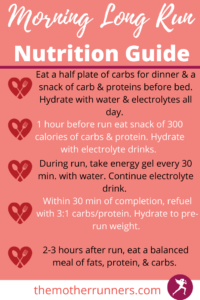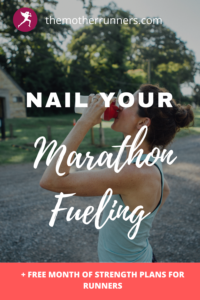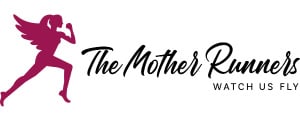Successful marathon training requires fueling well before, during and after your training runs.“If you run, you are an endurance athlete and need to view food differently. Food is fuel for your body and should not be restricted or feared,” says registered dietitian Kristy Baumann. She suggests eating about an hour before runs, about every half hour during runs (with energy gels), and within a half hour of finishing a run. Learn more about what and what not to eat and when from Baumann below.
One of the major perks of being a marathon runner is getting to eat. A lot. But not eating right and not eating enough can torpedo your marathon training. With all this talk of gels, GUs, gut training, fasted running, depleted state running…marathon fueling can get pretty complicated.

Pretty much every runner has their war stories of runners’ trots or bonking or cramping due to botched marathon fueling. As a first time marathoner, I barely made it across the finish line before running to the bathroom.
And, alot of distance runners (myself included), have stories of poor performance and bad recovery due to under-fueling.
Related: How to Train Your Gut to Stop Runner’s Trots
Skip Ahead
My experience with improper fueling

When I started training with a coach, I did not adjust my running nutrition. I was in the throes of early motherhood and most of my runs were early, there was little time to eat when I got home. Then I realized I wasn’t recovering well and wasn’t ready for the next workouts. My legs felt flat and my times were not progressing.
I spoke with my coach who reminded me that I should be eating before my runs and refueling almost immediately after my runs. This was a game-changer as far as my running recovery went. But there was still a lot to learn.
That’s why I linked up with mother runner and nutritionist for athletes, Kristy Baumann (also known as @marathon.nutritionist on Instagram) to give us a tutorial on Marathon Fueling 101. What I love about Kristy is that she keeps fueling simple. There are no gimmicks. No quick fixes. Her goal is to allow you to train hard and remain healthy. (I also partner with Kristy for nutrition help for my athletes. Learn about that here.)
In order to do that, you must fuel–stock your muscle glycogen stores–for the run.

“If you run, you are an endurance athlete and need to view food differently. Food is fuel for your body and should not be restricted or feared. If you are not eating enough, you are not taking full advantage of your training and you are risking getting injured,” she says.
Below are Kristy’s insights into how to nail your marathon fueling and running nutrition.
Let’s get going!
What should I eat before I run?
Fueling as a runner is very individualized. Besides considering your food preferences, level of fitness, and age, here are some other things to consider about your run/workout:
- What is the intensity of your workout? – Are you going for an easy run or doing an interval/track workout?
- How long will you be running for? Is it a short run or will you be running over 45 to 60 minutes for one of your long training runs?
- How sensitive is your stomach? Some runners can walk out the door eating a banana without having any GI issues while others need at least an hour or more to digest food so they aren’t taxing their digestive system.
Generally speaking, if you are going to start running in less than 1 hour, focus on eating simple carbohydrate foods that are easy to digest. Getting enough carbohydrate to fuel your running is key for success and recovery including energy levels after.
Common foods for runners include applesauce, dried fruit, banana, pretzels, saltine crackers, or English muffin with honey or jelly. Choosing more liquid carbs like sports drinks or sports gels can also help as they are easier to digest.
Related: 20+ Easy Snacks for Runners
How long before a run should I eat?
If you have 1 to 2 hours before a run: include both carbohydrate and protein foods in your pre-run fuel. For example, a slice of bread with peanut butter and banana or cottage cheese with fruit.
If you have 3 to 4 hours before a run: eat a balanced meal that includes carbohydrates, protein, and fat. Some meal ideas include a bagel sandwich with eggs and cheese, pasta with chicken and marinara sauce.
Is it okay to run on an empty stomach?
If you ate less than 3 to 4 hours ago, you are running at an easy pace for less than 45 to 60 minutes, and aren’t going to get hungry during your run — these are reasons why you wouldn’t necessarily need to eat prior to running. Most of the time, fueling before a run is going to be beneficial.
What should I eat before a long run or hard workout?
For the day before a long run, increase the number of carbohydrates you eat, filling half your plate with carbohydrates. This can be especially helpful to do at dinner when you’re running the next morning.
If you’re an early morning runner, it can also be beneficial to eat a bedtime snack that includes a carbohydrate and protein (like cheese and crackers). This can top off your glycogen stores before going to bed which will help fuel your run the next morning.
The morning of your long run, eat a snack of a few hundred calories of carbs and protein.
What should I eat before a marathon?
Marathon runners want to start increasing carbs and fluids about one week ahead of their marathon and four days before their half marathon. Begin increasing your carbs at every meal, snack and drink. Aim for 6-10 grams of carbs for every kilogram of weight. Get this number by dividing your weight in pounds by 2.2 grams and then multiplying it by 6 up to 10 depending on your size.
Get all the details on carb loading here.
How to Carbo Load Before a Marathon or Half Marathon

What should I eat after I run?
After a run, you’ll want to refuel with both carbohydrates and protein. An ideal ratio would be 3:1. This means for every 3 grams of carbs, you’d have 1 gram of protein. Your muscles need both of these components to recover.
About 20 to 25 grams of post-exercise protein is optimal to stimulate muscle growth. Proper recovery nutrition means that it decreases your risk for injury, increases glycogen stores, improves muscle repair, and you’re able to get the most out of your workouts.
Some great options for refueling include chocolate milk (or soy milk); drinkable yogurt; banana & peanut butter on toast; sports bar with protein; fruit smoothie with protein powder; fruit and yogurt parfait.
When should I eat after I run?
You want to aim to refuel within the first 30 to 45 minutes after a run. This becomes especially important after you’ve run for longer than 60 minutes or just finished a speed/track/interval workout. Your muscles are primed and able to better absorb glucose to maximize glycogen stores and rebuild muscle so you recover faster for your next run/workout.
The next 2 to 3 hours eat a full meal as your body is still recovering. You want to have a balanced meal with carbs, protein, and fat. This continues to be an optimal time for your muscles to rebuild and replenish glycogen stores.
Related: How to Carbo Load Before a Marathon or Half Marathon
What foods should runners avoid?
If you have a sensitive stomach, limit or avoid those foods that cause GI distress. For some people this is milk or dairy products; gas-producing vegetables like cabbage, broccoli, cauliflower, Brussel sprouts; high fiber foods like beans; and fried foods or high-fat foods.
Related: Should You Eat Before You Run?
When should I drink after I run?

Hydrate the days leading up to a long run or hard workout. It’s not only important to drink fluids right before a run, but even more important during the days leading up to the run in order to be well-hydrated.
When you only have less than 1 hour before a run, focus on drinking sips of fluid.
What should I drink before a run?
Having an electrolyte-rich beverage during this time is often beneficial. When you have 1 to 2 hours before going out for a run, aim for 8 to 16 ounces of fluids; and when you have 3 to 4 hours before a run, aim for 16 to 24 ounces of fluid.
What should I drink after a run?
After a run, you want to refuel with both fluids and electrolytes.
Related: 8 Best Electrolyte Drinks for Runners
Ideally, you will have weighed yourself before your run (and before you hydrated) to know your pre-run weight or performed a sweat test. In general, runners should aim to drink 16-24 ounces per pound of body weight lost. Aim for at least 400 mg of sodium after your run.
Once again, this becomes especially important during those times you’re sweating more, running in the heat and humidity, or running at altitude. Sodium is the most important electrolyte to replenish, so consider a beverage higher in sodium like Pedialyte.
Get all the Hydration Plan for Runners here.
How much should I drink after a long run?
You’ll want to consume 16 ounces of fluid for every pound of body weight lost from a workout. In order to know the number of fluids you’ve lost, consider doing a sweat test. This is where you weigh yourself before and after a 60-minute run to see how much weight you’ve lost. For every pound of body weight lost, this is equivalent to 16 ounces of fluids lost.
Keep track of any fluids you consumed during that 60-minute workout. For example, if you consumed 8 oz water and lost 1 pound of body weight, that’s a total of 24 oz fluid lost.
Related: 3 Proven Ways to Refuel + 2 Yummy Recipes for Runners
What should you eat during a marathon training run?
During runs longer than 1 hour, you will want to include fluids, electrolytes, and carbohydrates as part of your fueling strategy. Aim to consume 30-60 grams of carbohydrates per hour for runs lasting 1 to 2.5 hours.
Your fuel source can come from a combination of energy chews/gels, carbohydrate-based drinks, candy, dried fruit, sweet potato, honey, maple syrup, or other real food options. An energy gel typically has about 20-30 grams of carbohydrates. This means just taking 1 energy gel plus water does not meet the recommended intake of carbohydrate needs per hour.
For proper fueling, begin taking carbohydrates about 30 minutes into your run. Continue fueling every 30 minutes.

For runs lasting longer than 2.5 hours, it’s recommended to increase your carbohydrate intake to 60 to 90 grams of carbohydrates per hour.
Start fueling early during your run to prevent you from falling behind later on. If blood glucose or glycogen is not available, your body will need to break down other forms of energy, which is not efficient, can lead to muscle breakdown and fatigue.
You can carry your energy gels using a fuel belt or wearing a pocket bra and/or shorts. I share the best pockets shorts and pocket bras here.
What should I drink during a long run or marathon?
Aim to drink a dixie cup of water with each gel or gu, and aim to sip on an electrolyte drink in between. You can also take electrolyte tablets like SaltStick or a gel like Huma Gel Plus that includes electrolytes. Aim for about 400mg of sodium an hour with a couple ounces of fluids every mile.
You can also carry a water bottle or use aid stations. For my marathons, I carried a Nathan water bottle for the first half of the marathon, then dropped and use water stations.
I detail how I fueled my 2:54 marathon here.
Related: 6 Best Energy Gels for Runners
What is the biggest mistake most runners make when it comes to marathon fueling?

The #1 mistake I see is under-fueling your runs! Runners are weight conscious. We live in a society where we’re told to move more and eat less. These messages are targeted towards the average non-active individual, yet as health-conscious runners, you may think this applies to you as well. If you run, you are a runner and need to view food differently.
Food is fuel for your body and should not be restricted or feared. If you are not eating enough, you are not taking full advantage of your training and you are risking getting injured.
Related: My Nutrition Plan for My 2:54 Marathon
Key Marathon Fueling Tips for Runners
- An hour or so before a run lasting longer than an hour, eat a few hundred calories of carbohydrate and protein foods.
- Always stay hydrated with water and electrolyte drinks but drink extra in the days before a long run or workout.
- Refuel within 30-45 minutes with carbs and protein after a long run (or at the finish line).
- Eat a balanced meal with carbs, fats, and proteins 2-3 hours after a long run.
- Hydrate with water and electrolytes immediately after your run and throughout the day to your pre-run weight.
- Take energy gels every 30 minutes during runs later longer than an hour.
- Drink electrolyte drinks throughout your run.
- Remember that food is FUEL you do not have to earn or run off!
Fueling before, during, and after your runs is important and makes a big difference in how you feel. However, the meals you eat on a daily basis truly fuel your body and sets you up for feeling energized on your runs. If you are looking for more support with your fueling strategy and how to create balanced, satisfying meals that support your performance, follow Kristy on Instagram @Marathon.Nutritionist.
If you want guidance with your running goals, check out my run coaching services. Also, be sure to check out my free training plans:
